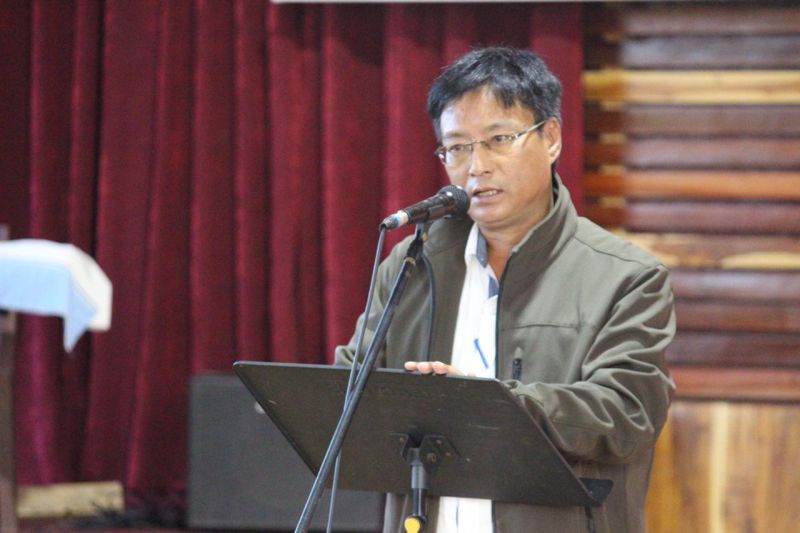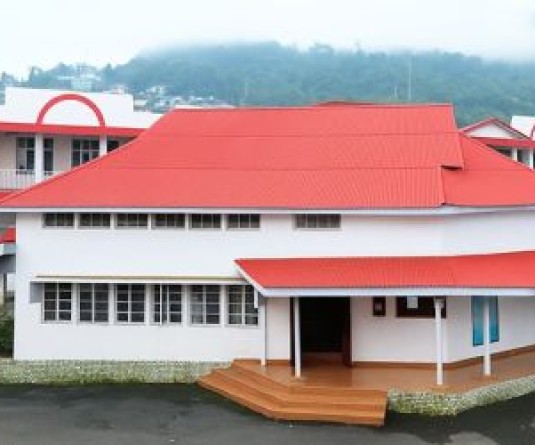Kahuto Chishi Sumi speaking at the Oriental Theological Seminary’s ‘Church and Society Annual Lecture’ held in Dimapur on December 5.

Kahuto Chishi Sumi speaking at the Oriental Theological Seminary’s ‘Church and Society Annual Lecture’ held in Dimapur on December 5.
Lecture on relevance or irrelevance of customary laws in contemporary society
Morung Express News
Dimapur | November 5
‘Change’ has been one word that has become an all pervasive expression in contemporary Nagaland. The transformation from trophy headhunters to professed Christians with modern education and lifestyle has been obvious. But have the Nagas as a society progressed beyond to transform and be amiable enough to move with the social shifts and turns of the 21st century was at the core of a lecture delivered by activist and social commentator Kahuto Chishi Sumi at the Oriental Theological Seminary’s (OTS) Church and Society Annual Lecture in Dimapur on December 5.
“The Relevance and/or irrelevance of customary laws in contemporary society (with an emphasis on Naga Christian society)” was the topic.
According to Sumi, customs and laws are rules that regulate society yet the latter tends to be difficult to change or abolish. However, he said that “advances in civilization change the context of many customs” nullifying their validity and demands adapting to the changes shaped by advances in science, technology and governance.
“Change, in nature and society, is inevitable, therefore customary laws, practices and traditions must either be adapted to suit the changes society undergoes, their practice must be abandoned altogether or they must be abolished,” he said. He added that a state or society that cannot adapt its customs to the changes that development brings about remains regressive.
Juxtaposed with Christianity, he posed, “Nagas share the universal message of Christ, so do we need our separate, regressive tribal customary laws?”
Save some, he held that Naga customary laws are hardly applicable to a modern society, “least of all a Christian one.”
Naga parents today, gift landed property in the towns to daughters yet he maintained that it has been possible because lands in urban centres are not regarded as being bound by customary laws as in the villages.
“If we can allow women to inherit landed properties in urban centres, something that is expressly prohibited by Naga customary law, how can we object to their reservation in Urban Administrative Bodies when there is no Naga customary law against it?”
On the same note, he questioned the logic of ex-communicating electoral contenders for going against the wishes of the village council.
He cited the instances of banishment from the village as punishment for serious crimes like murder and rape or punishments in excess or way below the magnitude of the crime. “In our head hunting days, banishment was a virtual death sentence, and the ultimate penalty for a crime. But banishment from a village for murder has no validity today.”
Another downside of customary laws is its vulnerability to distortion to serve vested interests, he added.
“It is time for all Nagas to make a critical examination of our customary laws. We cannot accept the benefits of modernity and claim to follow Christ while rejecting the rights of weaker sections.”
The lecture and subsequent interaction with the audience was peppered with comments on corruption in governance and Nagaland Liquor Total Prohibition Act, especially the NBCC’s dogged stance on continuing with the failed law.
While stating that a common resentment against corruption is building in the minds of the Naga youth, across tribal lines, he warned of a time when ordinary citizens would rise up.
Amidst the mess, he termed the Church as one institution that can act as a catalyst to real change. However, he maintained it must no longer be ambivalent.
According to him, a perceived silence of the Nagaland Baptist Church Council (NBCC) on corruption in Nagaland “has seen its moral authority being eroded beyond measure.”
He said that the NBCC could do more than ‘straddling the fence’ and start acting proactively and “speak out against the many perversions of our Naga customs that occur on a regular basis; regain your moral authority and strengthen your spiritual authority.”






